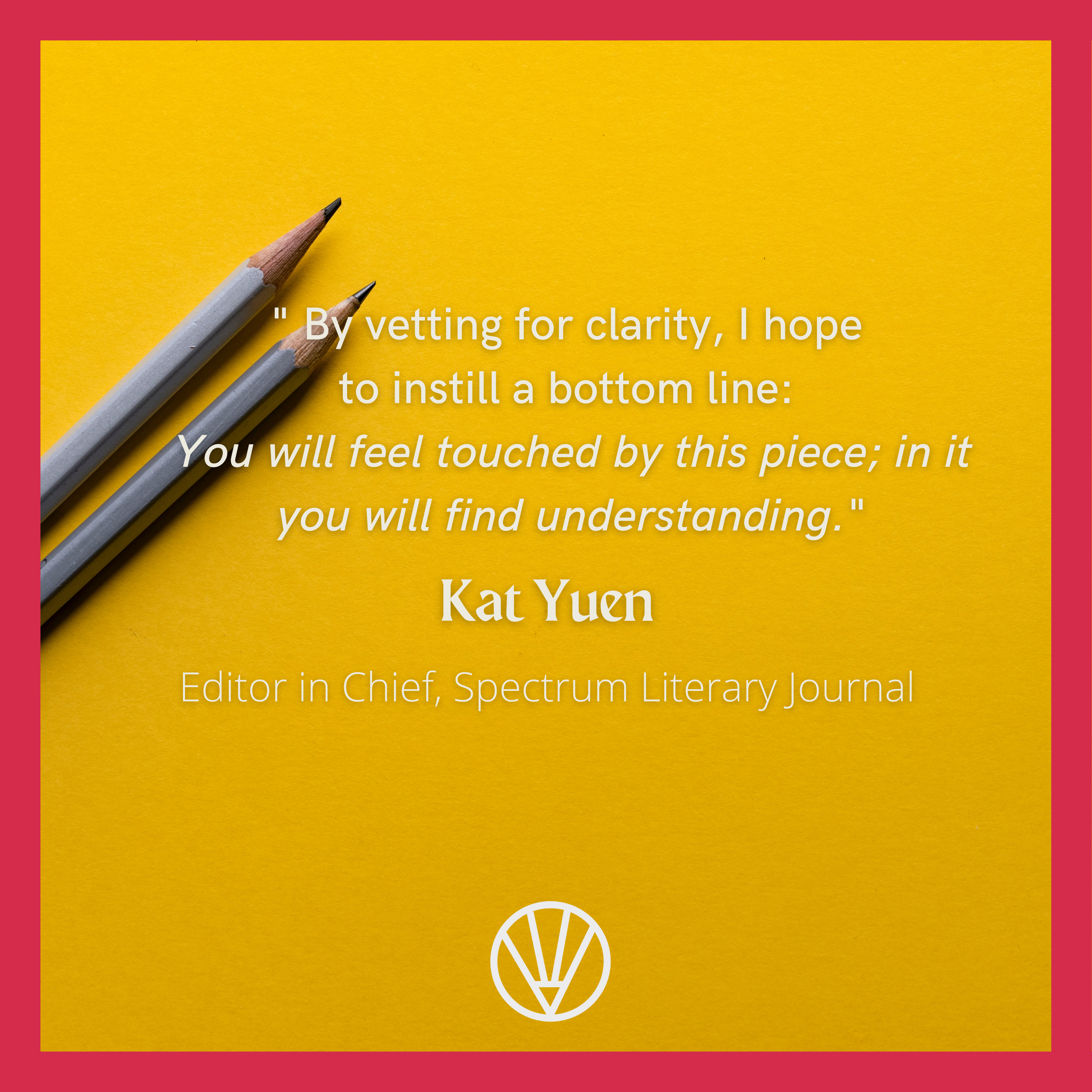On Clarity and the Role of Editors

“Are you saying what you want to say? … Are you saying it as clearly and consistently as possible?” —Alan D. Williams, listing an editor’s two core questions for authors
“Don’t pass judgment on a manuscript as it is, but as it can be made to be.” —M. Lincoln Schuster, giving advice to nascent editors
As staff on Spectrum, ours is a position which demands judicious reading, and a stringent eye. How each staff member makes their decisions differs, but in my time, I find myself returning to the issue of clarity, and the collective role of editors.
Near-all of us on the staff are students of writing, habituated in the practices of creative writing workshops; we spend the academic quarters giving developmental critiques and detailed revision notes to our peerage. We thrive seeing one another reach their goals, and celebrate each others’ growth over time. Far from the publishing-setting, forefront in our dialogues is Williams’ ideal of the editor-as-advocate, Schuster’s ideal of the editor-as-nurturer. To slide into the mind-space of reading-for-publishing, thus, is a rough shift.
Oh, if I could cash out every time we’ve wished we might offer developmental editing, to cradle submissions through revision and polish! Perhaps then it could be affordable, the time could be made, for such to be possible. Alas, it is not.
Despite the unyielding ways in which rejections are often doled out, often it is not without at least one of our staff members still in love with the work. Certainly, I could not list on both hands all the poems and prose-works I have loved, seen passed (to little grudge, now—I’ve come to recognize that the font of good submissions is unceasing; always will there be new pieces to love, and often those are the better). But always returning’s the rub: we cannot accept submissions with bruises, even if we love its potential, and often even those without flaws must be set aside for lack of page space. In asking about clarity, my line is more accurately a chasm: pieces which do not cross on first pass, fall.
My rubric of clarity is not for lack of time to puzzle over submissions’ depths, or a lack of will to do so. I acknowledge, even, the purposes of un-clarity, of obfuscation (and as a writer often play in that space myself). As a staff reader, however, I must embody both the audience and the editor: the eyes which will be consuming our journal, in addition to the hands curating it.
As a layperson, will I bother reading prose that does not grab me by the nape? Will I return to a poem if its title does not become the anchor for an image? Perhaps these seem aside, but assuredly both emotional affect and vivacity anchor themselves to clarity. If I cannot pick up a character’s development or the significance of their experiences, how will I be swept up in their apotheosis? How will a metaphor stain the page if I cannot make out its contours, its purposes?
In our hearts, I assure you, we hold writers’ passions and moments of brilliance. But, against our inner Schusters, we cannot read for aspirations, for kernels. As often as I wish I might adopt and help see a piece to its polished form, as often I only fall in love with a piece on a tertiary read, and must ask myself: is this amount of interpretive work worth it? Would someone perusing our pages be so compelled?
If not, then: will this piece be enjoyed?
As editors, we thrive on helping authors shape their works, and will often go to great lengths to advocate for the creations we love. Both Williams and Schuster, alongside their advice above, detail this advocacy, particularly within the publishing house. However, the act of editing is not just for the writer’s benefit—through submission selection we are also representing readers, editing for the benefit of curating something worth readers’ time and money.
This is not to say that we care about “upmarket” fiction, or a “formula”—after all, none of us are getting paid; the actual finances are irrelevant. Rather, my point is more spiritual, in a sense: as an editor, my judgement is a sanction; publication is a promise. By vetting for clarity, I hope to instill a bottom line: you will feel touched by this piece; in it you will find understanding.